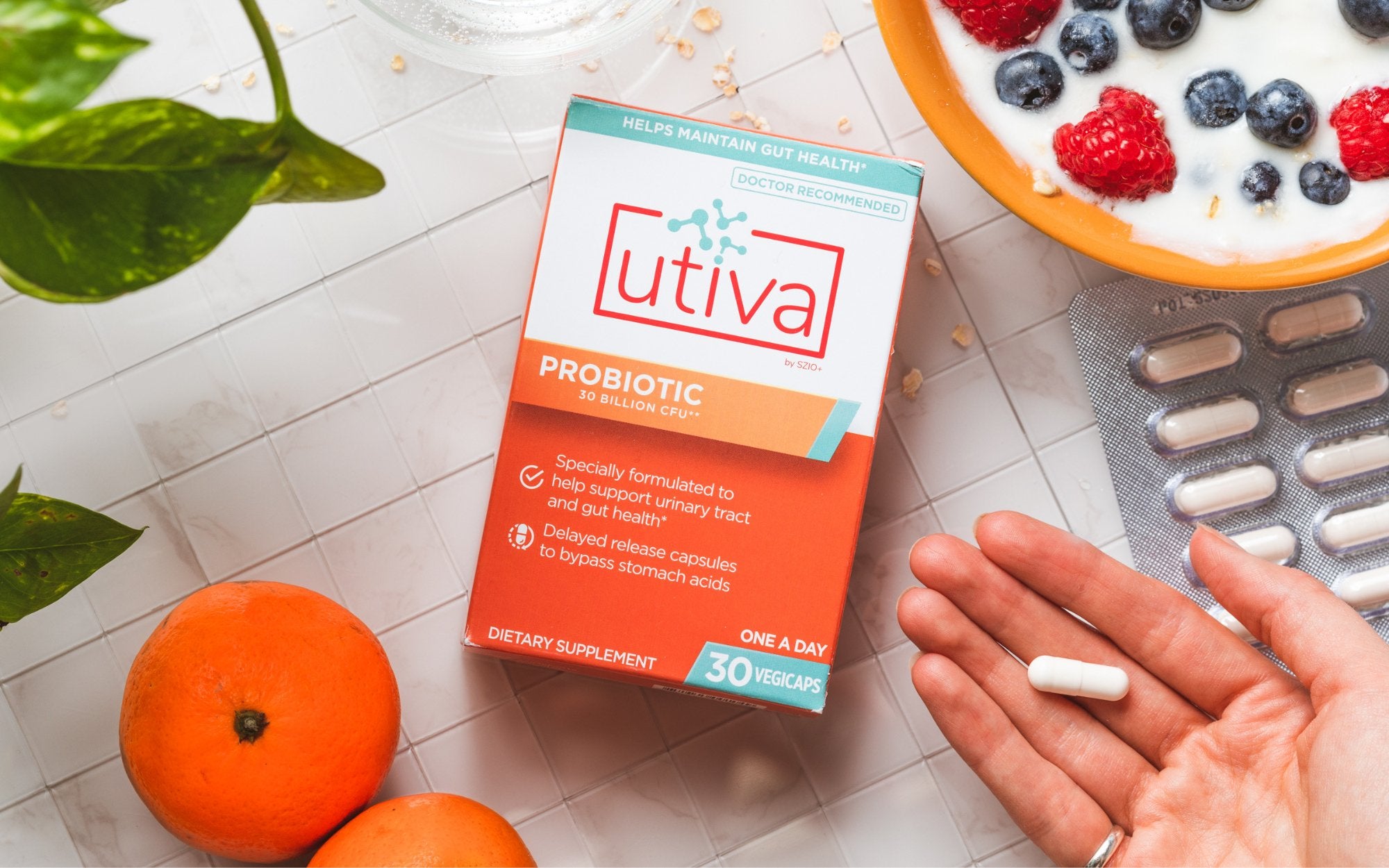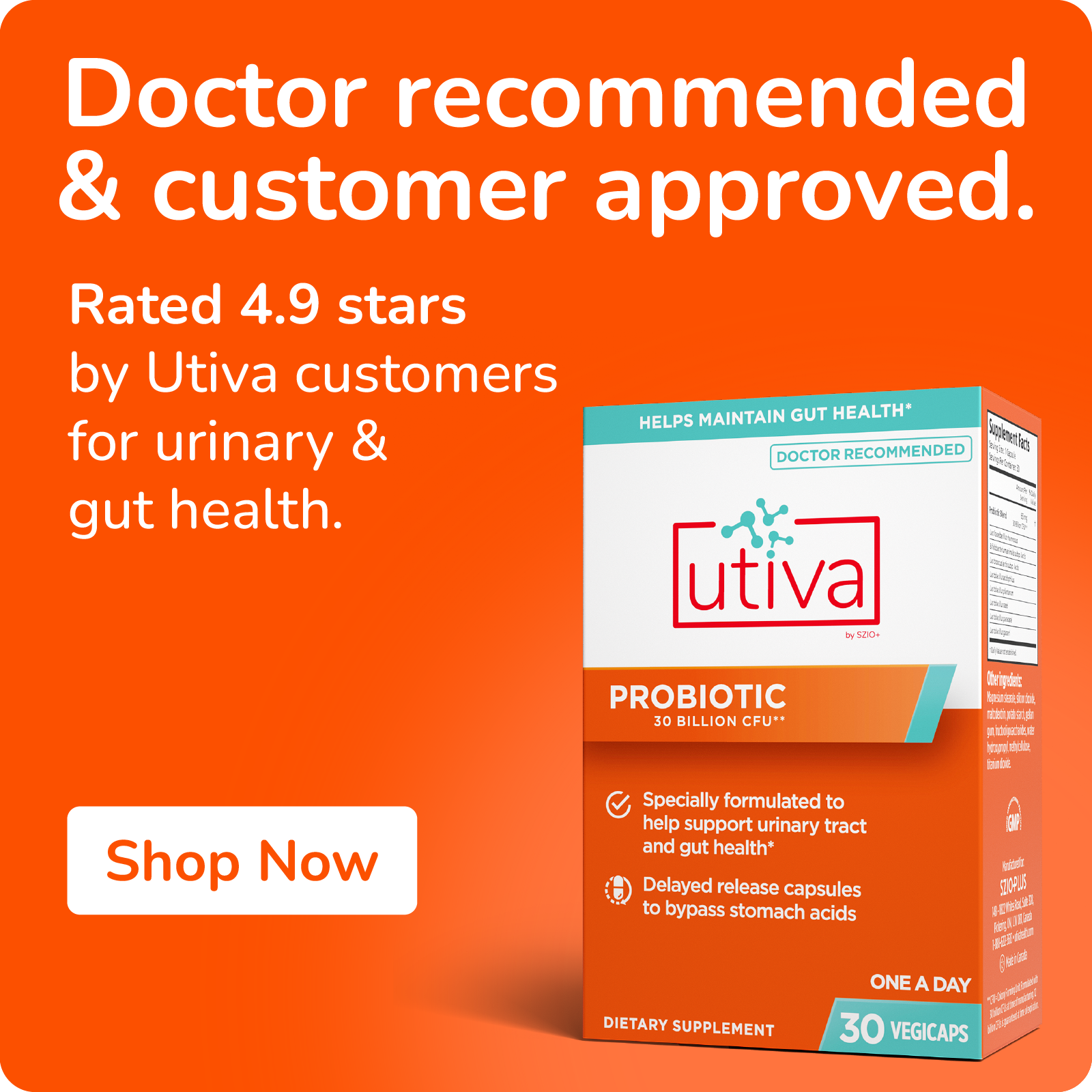Why should you take a probiotic with Lactobacillus to prevent UTIs?

There are so many amazing reasons to take a probiotic. It can aid digestion, balance the bacteria in your body, fight off infections, and boost energy levels. But for those who suffer from urinary tract infections (UTIs), the UTI-fighting benefits of a probiotic are high on the list. That is, if the probiotic has Lactobacillus.
Here are all the reasons why taking a probiotic with Lactobacillus is powerful for your health—especially for preventing UTIs.
What is Lactobacillus and where is it found in the body?
Your body is full of good and bad bacteria. Lactobacillus is one of the good guys. It’s a bacteria found in the human gut, mouth, vagina, and urinary tract.
Healthy bacteria like Lactobacillus can do amazing things for your body. It helps to digest food, absorb vitamins and nutrients, fight off illness and disease, and keep your immune system lifted. It can also soothe symptoms of menopause and help your body recover from antibiotics.
What is the role of Lactobacillus in the vagina and urinary tract?
Lactobacillus is especially important for your vagina and urinary system. The goal is to have a healthy mix of bacteria in both places and to make sure the bad bacteria never outweigh the good ones.
In your vagina and urinary tract, Lactobacillus prevents pathogens from colonizing the area. It acts like a bodyguard, shielding you from infection and disease. Certain strains of Lactobacillus also produce lactic acid and hydrogen peroxide. This creates an acidic environment in your vagina and urinary tract that makes it harder for harmful bacteria to grow.
What can cause your Lactobacillus levels to drop? What happens if they do?
There are several ways that you can lose Lactobacillus. First off, if your bacteria levels aren’t balanced between good and bad microbes, the bad ones can take over and kill off the Lactobacillus.
Bacterial Vaginosis (BV) can also cause Lactobacillus levels to drop in the vagina. BV is the most common vaginal condition for women between the ages of 15 and 44 but luckily, it’s easily treatable.
According to one 2018 study, it’s even possible that a high-salt diet can decrease Lactobacillus. Sad news for salt lovers.
So, what happens if Lactobacillus levels drop? Low Lactobacillus has been associated with a number of conditions and diseases. Women who have low Lactobacillus in their vaginas have an increased risk of BV, HIV infection, and gonorrhea. And if levels drop in the urinary tract too, you can become more susceptible to UTIs.
Why do low Lactobacillus levels cause UTIs?
A UTI happens when bad bacteria, typically E.coli, finds its way into your urinary tract and causes an infection. The bad bacteria takes over, displacing the good bacteria (like Lactobacillus) and messing with your microbe balance.
UTIs are incredibly common. Over 50% of all women will experience a UTI in their lifetime and 20% of them will have a recurrence of the infection. It’s no wonder UTIs are responsible for over 8 million clinic visits a year in the US.
Symptoms of a UTI can include painful urination, frequent urination, bloody or bad-smelling pee, and abdominal pain or pressure.
Scientists still aren’t 100% sure about the correlation between UTIs and low Lactobacillus levels. One scientific theory is that low Lactobacillus allows E.coli to colonize in the vagina and cause infections.
That’s why taking probiotics for UTI (with Lactobacillus, of course) can help restore the urogenital flora and prevent infection. There’s also scientific evidence to show that Lactobacillus can kill off E.coli or stop it from attaching to the urinary tract or vaginal lining.
How can you boost your Lactobacillus levels?
It can be so difficult to keep your bacteria levels in check. If your Lactobacillus levels drop, don’t stress. There are several ways to get things back into balance.
- Eat a healthy diet and exercise regularly. The healthier you are, the happier Lactobacillus will be.
- Add more fermented foods to your diet, like kimchi, sauerkraut, and yogurt. These foods are high in Lactobacillus.
- Take high-quality supplements to improve your immune system and boost your Lactobacillus levels.
Probiotics aren’t the only supplement that can support your Lactobacillus count and prevent UTIs. A 2019 study gave women a mix of cranberry proanthocyanidins (PACs) and probiotic supplements containing Lactobacillus strains. The results showed a significantly lower number of recurrent UTIs compared to the placebo subjects, plus a shorter duration of active UTIs and fewer subjects needing antibiotics.
 What are the best probiotics for UTI prevention?
What are the best probiotics for UTI prevention?
Utiva Probiotic is a powerful probiotic supplement. It has a unique blend of Lactobacillus and Bifidobacterium probiotic strains, specially designed to restore gut health and help the body recover from antibiotic usage. It may also help prevent UTIs through a boosted immune function.
This safe and acid-resistant probiotic has 12 billion CFU (30 billion CFU at the time of manufacturing), which is the amount required to guarantee effectiveness. In other words—it works.
 Want to pair it with a PACs supplement for better UTI prevention? Meet the 36PAC Power Bundle: Utiva Cranberry PACs and Probiotic in one dynamic duo. Utiva PACs is one of the best cranberry pills for UTI prevention. Taking both supplements together can stop bad bacteria from causing infection in the urinary tract while increasing the number of good bacteria in the region.
Want to pair it with a PACs supplement for better UTI prevention? Meet the 36PAC Power Bundle: Utiva Cranberry PACs and Probiotic in one dynamic duo. Utiva PACs is one of the best cranberry pills for UTI prevention. Taking both supplements together can stop bad bacteria from causing infection in the urinary tract while increasing the number of good bacteria in the region.
Utiva Cranberry PACs has also been recognized by the Society of Obstetricians and Gynaecologists of Canada (SOGC). That means it has been carefully reviewed by a panel of medical professionals to confirm it’s a safe and effective supplement—all based on scientific evidence.
Lactobacillus: your new BFF.
Staying educated on good bacteria and what it can do for your body isn’t just important, it’s fun. Same goes for your vaginal and urinary health. Our Utiva blogs, free e-book, and UTI 101 hub are all helpful resources to learn more about your health and how Lactobacillus and PACs can help.Knowledge is power
Sign up to our newsletter to keep learning!

- Choosing a selection results in a full page refresh.
- Opens in a new window.





